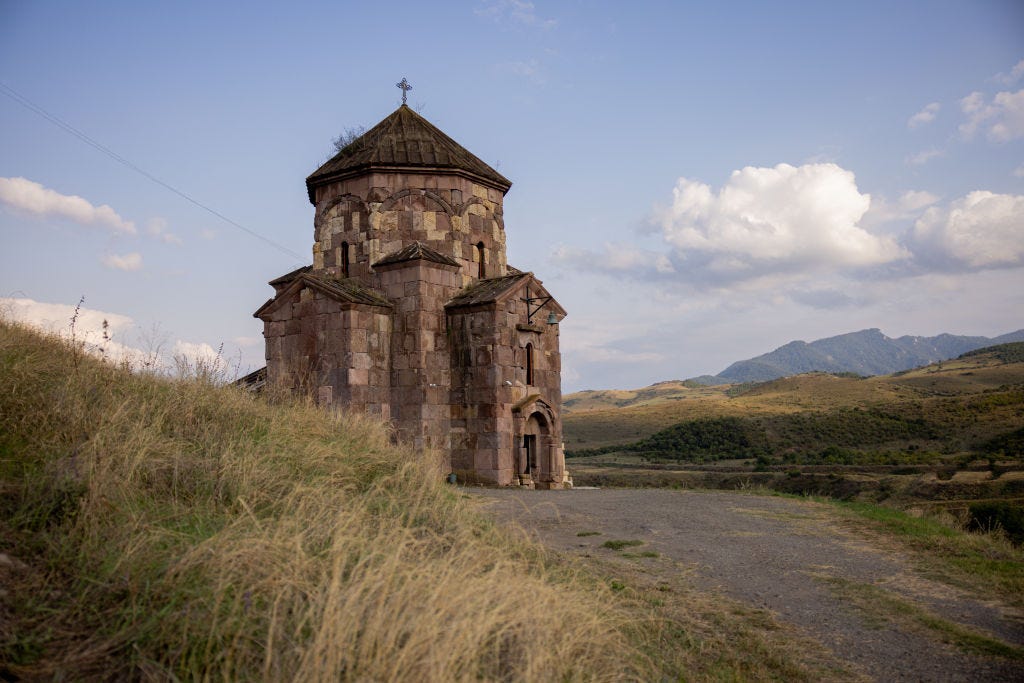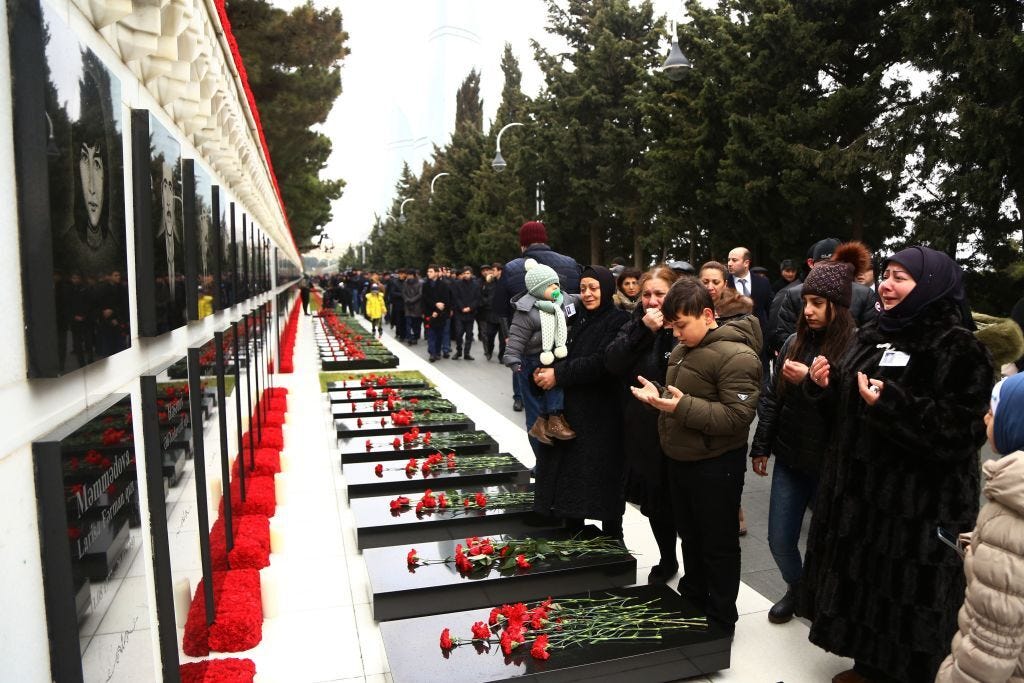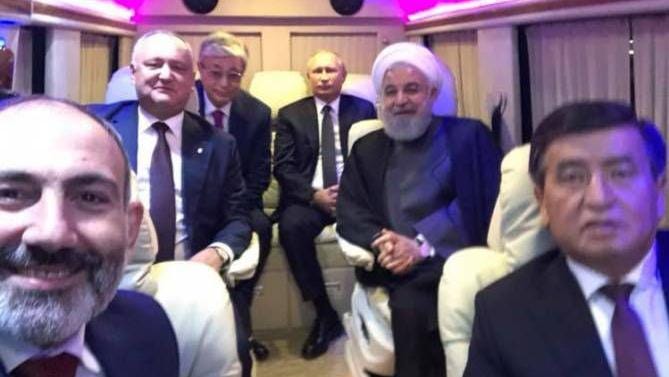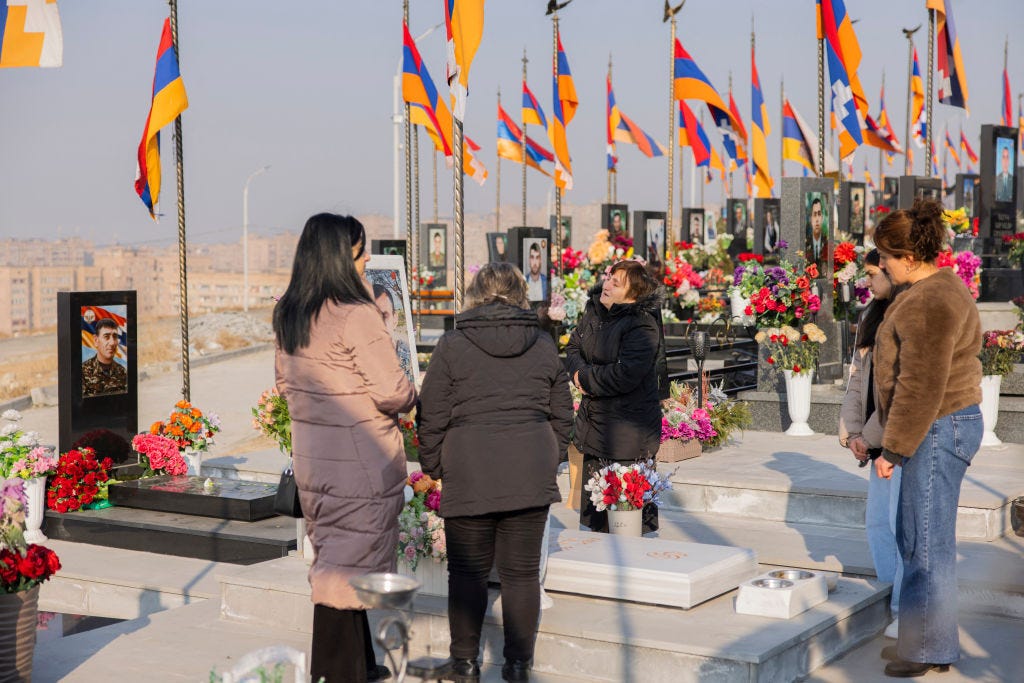What's stopping Armenia and Azerbaijan signing historic peace deal over Karabakh?
Hopes of a breakthrough to end decades of conflict remain in the balance.
By Grigor Atanesian and Magerram Zeynalov.

Armenia and Azerbaijan have agreed on the final text of a peace treaty to end their long-standing conflict over Nagorno-Karabakh, but hopes are fading that it will be signed any time soon. Disagreements on fundamental issues remain unresolved, and experts fear Russia may take advantage of the situation to restore its influence in the region.
In a message to believers on the day he left hospital last month, Pope Francis made an unexpected reference to a conflict most people around the world had probably long forgotten, if they ever knew about it at all.
"...I am glad that Armenia and Azerbaijan have agreed on the final text of the peace agreement. I hope it will be signed as soon as possible and thereby help establish lasting peace in the South Caucasus," the Pope wrote.
His enthusiasm was shared by official representatives of the Russian Foreign Ministry, the U.S. State Department, NATO, the European Union, Iran, and many other countries.
The Pope’s message followed an announcement on March 13, that after four years of work, Yerevan and Baku had agreed the last two disputed points of a peace treaty to finally put an end to a conflict which has cost thousands of lives and driven more than a million people from their homes over the past three decades.
But despite the good news, significant hurdles to peace still remain.
Three weeks after the announcement about the deal, Azerbaijani President Ilham Aliyev said it could only come into force when two additional conditions had been met — the amendment of Armenia's constitution and the dissolution of the OSCE Minsk Group that was created to facilitate resolution of this decades long conflict. Yerevan says it is ready to concede both demands, but amending the fundamental law requires a referendum, the outcome of which is unpredictable.
While the positions of the two countries have come closer, experts warn that further delaying the process could bury the chances for peace.
For one thing there are concerns over the long term future of the current ruling party in Armenia. It agreed to what many say are unprececented concessions over Karabakh but is not faring well with voters in local elections. The opposition is less inclined to compromise.
Observers are also concerned that Russia might interfere in the negotiations. Having lost interest in the South Caucasus at the start of its full-scale invasion of Ukraine, it may attempt to return to the region in case of a truce with Kyiv.
Military and diplomatic maneuvering
After the second Nagorno-Karabakh War in the autumn of 2020, the winner and loser effectively swapped places.
Azerbaijan regained control over seven regions occupied by Armenian forces since the mid-1990s, and also retook part of Nagorno-Karabakh itself, displacing thousands of Karabakh Armenians from their homes.
The only world power that showed interest in the conflict was Russia, and it was Russia that drafted the text of the ceasefire agreement.
After the truce, Baku wanted to immediately move to direct bilateral negotiations to conclude a peace treaty and formally consolidate its victory. However, Yerevan was not ready to accept the scale of its defeat and tried to regain its position on the diplomatic front to preserve at least part of Karabakh under Armenian control.
“One reason for the delay is that Yerevan had been seeking to soften the consequences of its 2020 defeat,” writes Olesya Vartanyan, a conflict analyst in the South Caucasus. “Armenian officials argued that reconciliation should be gradual, allowing time for trust between Armenians and Azerbaijanis to develop.”
Armenia tried to secure the support of Russia, the United States, and France—the co-chairing countries of the OSCE Minsk Group, established in 1992 to resolve the Nagorno-Karabakh conflict. However, Russia and the United States were hesitant to side with Yerevan, while France's pro-Armenian stance only strained relations between Paris and Azerbaijan.
After the full-scale invasion of Ukraine in 2022 and the escalation of hostilities along the Armenian-Azerbaijani border, during which Moscow refused to support Yerevan, Armenian authorities completely lost faith in guarantees from Russia. Unlike Nagorno-Karabakh, the internationally recognised territories of Armenia fall under the security guarantees of the Collective Security Treaty Organisation (CSTO) — a military alliance led by Moscow. Yet, Yerevan was left to face Baku alone.
Subsequently, a civilian EU observer mission was deployed on the Armenian side of the border. In January 2025, in the final days of the Biden administration, a strategic partnership agreement between the United States and Armenia was signed in Washington.
Simultaneously, the Armenian government broke with the past: Prime Minister Nikol Pashinyan recognised Karabakh as part of Azerbaijan and agreed to previously unimaginable concessions in the hope of achieving peace.

“Only amid Moscow’s distraction and weakening regional grip did serious negotiations begin,” according to Zaur Shiriyev, a non-resident scholar with Carnegie Russia Eurasia Center. Russia was “preoccupied with occupying its neighbour,” he says, and “lost its grip on the region”.
But at this point, Azerbaijan sensed an opportunity and the focus shifted from talks to the situation on the ground. With an undeniable military advantage over its neighbour and the status of an important gas partner to the European Union, Baku deployed its troops to retake control of the entire region. The 100,000-strong Armenian population of Karabakh fled en masse to Armenia.
In the aftermath of these momentous events, Armenia continued to comply with Baku's demands. Only two points remained contentious: the demand to remove European observers from the border and to withdraw mutual lawsuits from international courts.
European observers had been deployed to Armenia in February 2023, shortly after Azerbaijani forces occupied a small part of Armenian territory during border escalations. The observers' mission was to monitor the situation and note who fired first. Their presence on the border provided Yerevan with, if not protection, then at least the hope of independent arbiters who could guarantee objective information about the attacks. However, their presence greatly irritated Baku, with Azerbaijani pro-government media accusing the European observers of destabilizing the region and engaging in espionage.
Eventually, Pashinyan agreed to these Azerbaijani demands, believing Armenia had no other choice and that a peace treaty could secure the country. Both points were included in the final text of the peace treaty. Once it is signed, Yerevan is ready to abandon the services of European observers and withdraw the lawsuits from international courts.
But in the diplomatic arena, as on the battlefield five years ago, roles have shifted: now it is Armenia hurrying to conclude peace, while Azerbaijan is delaying the process.

Preconditions, claims and demands
As of today, the 17-paragraph text of the peace treaty has been fully agreed, and Azerbaijan has not introduced any additional conditions to the text. But Baku has let it be known that it still has outrstanding concerns which must be addressed before the peace deal can come into force.
"Our conditions for Armenia are known; they are not new," said Ilham Aliyev in early April.
He outlined two things which he said must happen next: the dissolution of the OSCE Minsk Group and the amendment of Armenia's constitution. "Once these two conditions are met, there will be no obstacles to signing the peace treaty. As they say, the ball is in Armenia's court," Aliyev added.
The OSCE Minsk Group was established in 1992 to resolve the Nagorno-Karabakh conflict, led by Russia, the United States, and France. In recent years, the group's work has effectively ceased, existing only on paper. Aliyev believes that "Azerbaijan has resolved the Karabakh conflict itself," and if there is no conflict, there is no need for an international group to address it.
The Armenian Prime Minister has indicated readiness to meet this demand. However, dissolving the group requires the consent of Russia, France, and the United States, as well as a decision by the OSCE Council of Ministers, whose next meeting is scheduled for December.
Fulfilling Aliyev's second condition—amendments to Armenia's constitution—will require an even lengthier and less predictable process.
In 2023, for the first time in over a thousand years, there were no Armenians left in Nagorno-Karabakh. However, the disputed region remains mentioned in the 1990 Declaration of Independence, which refers to its "reunification" with Armenia. The current Armenian constitution includes a reference to this declaration. Baku sees it as an official claim to its territory and demands its removal.
Azerbaijani diplomats argue that peace is impossible without this amendment: they say even if Pashinyan and his supporters are ready to permanently renounce Karabakh now, others could one day come to power and exploit the constitutional reference to this territory.
The Armenian government has tried to reassure Baku that there is nothing to fear. Armenia's Constitutional Court has ruled that the country's fundamental law does not contain territorial claims against other nations. Moreover, the peace treaty text includes mutual recognition of territorial integrity and a prohibition on invoking domestic laws to violate the treaty.
Pashinyan has also pointed out that Azerbaijan could be seen as making territorial claims of its own on Armenia. Not only do Azerbaijani officials regularly refer to Armenia as “Western Azerbaijan’. but Azerbaijan's current constitution refers to the declaration of independence of the first Azerbaijani republic in 1918, a document which claimed more than half of modern Armenia.
But Baku remains unconvinced by Armenian reassurances, and perhaps anticipating this response, the Armenian government has been putting plans in place for more than a year now, for a constitutional referendum. Officially Pashinyan claims that the need for a new constitution is unrelated to Aliyev's demands, but independent experts believe it is primarily done to appease Azerbaijan. The most likely time for the referendum could be the summer of 2026, when the next parliamentary elections are scheduled—allowing the constitutional question to be included on the ballot.

Russia and the ghost of a new war
For many observers pushing things back until 2026 is just too long to wait.
“The window is narrowing,” Zaur Shiriyev writes. “If no agreement is signed by the year’s end, the momentum built since 2022 could collapse.”
Shiriyev warns that any further delays could also make it more likely that Russia would turn its attention back to the South Caucasus. A potential ceasefire in Ukraine —and especially one seen as favourable to Moscow, would give Russia space to return to the scene—and to do so at a time when the United States is clearly far less engaged in the process than previously.
While the Biden administration sought to play an active role in the region, the actions and statements of Donald Trump's team have prompted the Armenian government to seek "more rational" relations with Moscow, based on cold calculation, says Armenian political scientist Tigran Grigoryan.
"When the new administration in the United States itself initiates contacts with Moscow, the message is clear to everyone—especially to Yerevan: solve your own problems with your neighbours, with Russia." — Grigoryan told “Echo of the Caucasus” a Russian-language affiliate of the Radio Liberty/Radio Free Europe.
Observers agree that there’s little love lost between either Azerbaijan or Armenia and their former imperial overlord, Moscow.
Azerbaijan blames Moscow for its defeat in the First Karabakh War in the early 1990s. Armenia blames Russian collusion with Azerbaijan for its defeat in the Second Karabakh War.
Both countries have sought to forge alliances elsewhere.
In the early 2010s Yerevan began the process of European integration, but in 2013, the Kremlin managed to prevent the signing of an Association Agreement between Armenia and the EU. The process has now been restarted and discussions about visa-free travel are actively underway, but Armenians fear that it might once again fall through.
For Azerbaijan, Turkey is now a key military and diplomatic ally, and relations with Moscow have further soured after the accidental downing of an Azerbaijani aircraft by Russian air defence forces in December 2024.
There are few illusions now on either side that Russia could genuinely play a positive role. As Azerbaijani political analyst Natig Jafarli said in a recent interview with the Armenian channel Civilnet.
"Russia can only return to the region through conflicts, not peace."
Mistrust and longer term concerns
But aside from worries about Russia, there continues to be deep distrust between Baku and Yerevan.
In Armenia, there are also concerns that even after adopting a new constitution, Baku will not rush to sign a peace agreement. Olesya Vartanyan quotes Armenian politicians and foreign diplomats suggesting that this might be followed by demands for nationwide apologies or mass repentance for Karabakh.
In a conversation with the BBC, political analyst Tigran Grigoryan separately noted that Azerbaijan increasingly tries to portray the restoration of the Armenian army after the defeat of 2020 as militarisation and demands a halt to foreign arms supplies to Armenia. He suggested that after constitutional changes and the dissolution of the OSCE Minsk Group, the next demand might be restrictions on the size and armaments of the Armenian army—and that these demands could lead to new escalations.
In early April, Aliyev once again complained about "rapid armament, acquisition of lethal weapons, and Armenia's provocations encouraged by France." This refers to France's recent arms sales to Armenia, including Caesar howitzers—which has drawn protests from Moscow and Baku. Another key supplier of modern weaponry is India, from whom Armenia acquires multiple rocket launch systems, among other things.
"Do Armenia's army reforms have anything to do with Azerbaijan? Both yes and no," said Pashinyan in response to these accusations. Armenia does not intend to attack its neighbour but is trying to prepare for threats emanating from it, he explained.
In recent weeks — after the announcement of a peace treaty agreement — Azerbaijan has regularly accused Armenia of border shelling. Armenia's Ministry of Defence denies these accusations, as does the EU monitoring mission.

Political risks and relative borders
The outcome of the referendum on the new constitution will be closely tied to Pashinyan's political fate. The initiative is entirely his and that of his ruling party, while various opposition forces, ranging from pro-Russian to pro-European parties, oppose the amendment of the basic law.
Recent election results in Armenia indicate that the ruling party no longer has the support of the majority of voters. The latest were the elections to the city council of Gyumri, the country's second-largest city, where the ruling party failed to secure a majority, and an opposition mayor is expected to be appointed.
However, local elections do not always reflect the national situation—for instance, the electoral campaign in Gyumri was influenced by local disagreements. Moreover, in parliamentary elections, the party's list will be led by Pashinyan, who remains the country's most popular politician, even if his rating has plummeted since the beginning of his tenure. The opposition, meanwhile, is deeply divided and lacks a unified leader—even groups without ideological differences, such as the parties of former presidents Serzh Sargsyan and Robert Kocharyan, often quarrel among themselves.
Two other issues not mentioned in the text of the peace treaty could also serve as triggers for renewed conflict. One is border delimitation and the other is road links.
So far, representatives of the two countries have only agreed on a position concerning a small section of the border. Accusing Armenia of shelling, Azerbaijan's Ministry of Defence refers to a "conditional border" and insists on using Azerbaijani names for territories within the Republic of Armenia.
The issue of road links also remains unresolved. After the peace treaty is concluded, the borders between the countries are supposed to open up—but under what conditions has remained a point of contention for nearly five years. Azerbaijan insists on the right to a "corridor" through Armenian territory linking its mainland to the exclave of Nakhchivan. According to Baku, this corridor should be an uninterrupted route beyond the control of Armenian border forces—guarded instead by a third party, for which Russia has offered the services of its FSB border guards.
Yerevan views this scenario as a violation of its sovereignty and territorial integrity. Instead, it proposes compromise solutions, such as outsourcing passport and customs control at this section to an international company. The idea is that Azerbaijanis would not deal with Armenian border guards, but Armenia would still maintain control of its border.
Baku rejects compromise options but is actively constructing its sections of the railway that is meant to operate along this route. This means Pashinyan might soon face a dilemma: make yet another concession on an issue he has described as a "red line" for Armenia or refuse—in circumstances where no global or regional powers guarantee Armenia's security.
"We have been and remain as creative and flexible as possible on this issue," said the Armenian Prime Minister. "It is unclear why these proposals are being rejected by Azerbaijan. I hope it is not for the purpose of creating a false pretext for escalation."
Read this story in Russian here.
English version edited by Jenny Norton.





